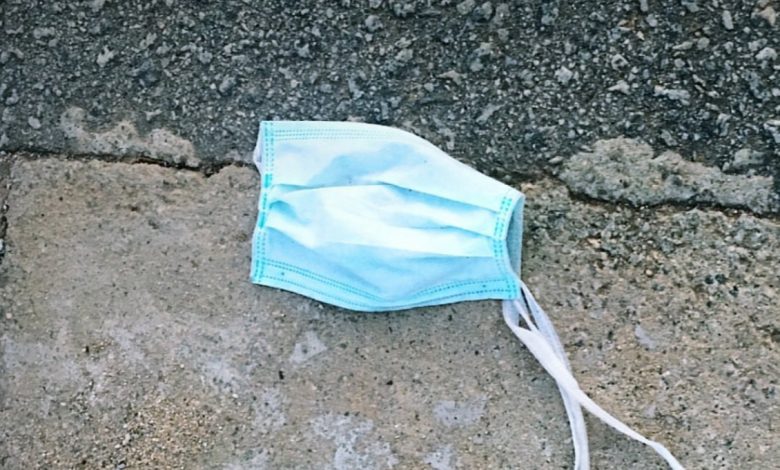Poor Disposal Of PPEs Will Increase Plastic Pollution, Experts Warn

While the Presidential Task Force on COVID-19 has advised Nigerians to wear face masks and that frontline healthcare workers put on protective gears against the virus infection, little attention is being paid to the disposal of the materials after use. However, environment experts warn that the poor disposal of the items will worsen the plastic waste crisis in the country.
Face masks, gloves and hand sanitisers are products made of or put in plastic materials which are some of the leading causes of environmental pollution globally.
While these non-recyclable or non-reusable protective products are designed to protect people from getting infected or spreading the disease, they are also negatively affecting the environment and rolling back efforts to reduce plastic pollution in Nigeria.
Nigeria generates an estimated 32 million tonnes of solid waste per year, one of the highest amounts in Africa.
Of that figure, plastic waste constitutes 2.5 million tonnes and a common sight across the country are plastic wastes in water bodies, gutters and across empty public spaces.
These are not disposed of properly due to limited access to bins and sustainable waste management systems.
Kingsley Adindu, Head of operations, Share Your Self said, “the current global novel coronavirus pandemic has brought to the fore new concerns over waste management, especially for medical waste handling in Nigeria and all over the world.
“The new trend of plastic protective gear, which is the acceptable standard, is already creating enormous problems for us here, more than our capacity to handle,” he added.
Hundreds of thousands of wrongly discarded gloves, face masks and sanitiser bottles amplify the country’s pre-existing waste management problem and pose a threat to marine life, wildlife, flood management and the fight against plastic pollution.
Similarly, single-use laboratory plastic and Personal Protective Equipment (PPE), worn everyday by frontline healthcare personnel to protect themselves and patients constitute a major environmental hazard if they do not pass through specialised processes and facilities where they are sterilised and incinerated at high temperatures.
According to Taiwo Adewole, an environment sustainability expert, all face masks and latex hand gloves must be kept in a separate waste bag and closed very tight before putting them in the general waste package for disposal.
Adindu further explained that the poor disposal of protection materials by the public would create more room for infections and worse plastic waste issues.
He said, “the new trend of individuals using latex gloves and surgical masks whenever they go out (which is good), has created even more problems for waste management across Nigeria.
“Because many do not understand that even those are medical plastic wastes, they dispose of them at the roadside, creating more potential for infection and also plastic waste issues.
“Some even dispose of it (mask) as household waste, and that is very risky,” Adindu said.
Amusa Victor, the founder of Vicfold Recycle, added that the government must consider dealing with medical waste to avoid further complications.
He said, “As much as the government will argue as to what budget they have to cater to the medical waste it is worrisome to know that PPE waste is no longer confined to only confirmed cases.
“A lot of suspected carriers are daily dropping off their PPE or otherwise contagious waste into water bodies, municipal waste bins and even roadsides, residents need to avoid contact with these contagious waste as much as they can.
“Improving adherence to international clinical and plastic waste management standards are important for public health safety and biodiversity protection in Nigeria,” Victor said.
Support Our Journalism
There are millions of ordinary people affected by conflict in Africa whose stories are missing in the mainstream media. HumAngle is determined to tell those challenging and under-reported stories, hoping that the people impacted by these conflicts will find the safety and security they deserve.
To ensure that we continue to provide public service coverage, we have a small favour to ask you. We want you to be part of our journalistic endeavour by contributing a token to us.
Your donation will further promote a robust, free, and independent media.
Donate HereStay Closer To The Stories That Matter




